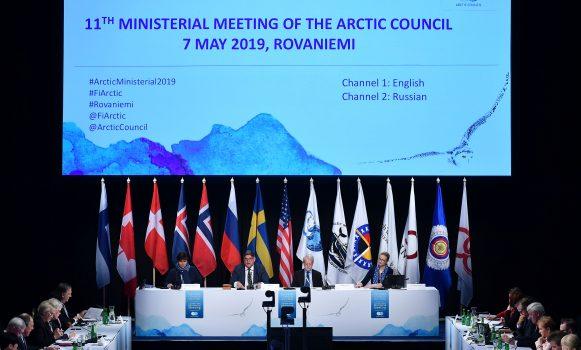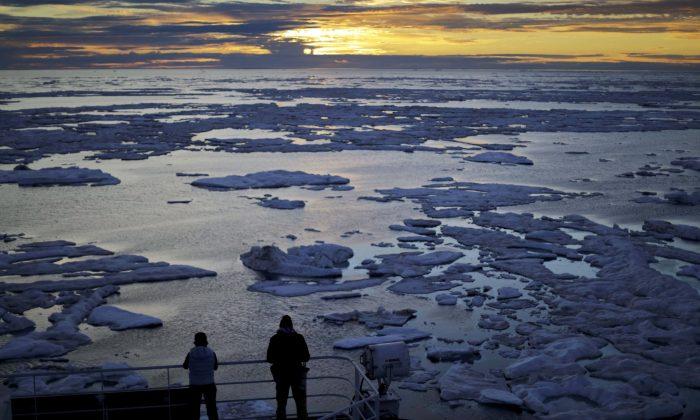NEWS ANALYSIS
Canada’s Arctic sovereignty was just challenged by the United States, and it also received overtures from China, but an expert says that while international attention on the Arctic is not new, it underscores Canada’s lack of success in the region.
Ken Coates, a University of Saskatchewan public policy professor and native of Yukon, says international interest in the Arctic piques from time to time and that’s when Canada reacts. But normally, Canada isn’t sufficiently focused on Arctic issues and isn’t “terribly credible as an Arctic nation on a global scale.”
He also nixes the narrative that there is tremendous interest in the Arctic.
“The symbolic importance of the Arctic is often greater than its practical significance,” said Coates, the Macdonald-Laurier Institute’s senior fellow in Aboriginal and Northern Canadian issues, in an interview.
One reality is that the development of Inuit lands by Canada remains stuck in low gear while international attention may be becoming increasingly tempting for Indigenous peoples.
Sovereignty claims over the Northwest Passage, potentially a key shipping route, continue to be in dispute, and the Canadian government and the Inuit are not backing down.
An example of the “episodic interest” came with the Arctic Council ministerial meeting in Finland in early May, followed by China’s first hosting of the Arctic Circle forum with 500 participants from 30 nations in Shanghai.
When U.S. Secretary of State Mike Pompeo reiterated the Trump administration’s dispute of Canadian claims in his speech to the Arctic Council, he also expressed his wariness of Chinese expansion goals.

“Pompeo is putting these things more stridently than we’re used to,” Coates said. “He’s being more blunt, but that is a good characteristic of the Trump administration overall.”
China holds observer status at the Arctic Council and is being warmly welcomed by the likes of Iceland and Sweden. Liberal MP Andrew Leslie was part of a delegation in Shanghai on May 10 and conveyed a message that Canada is ready to partner with China on Arctic issues.
Leslie’s approach sparked a response from David Mulroney, former Canadian ambassador to China, who said Beijing will almost certainly behave in the Arctic as aggressively as it does in the South China Sea.
Mulroney said via Twitter that a stance like Leslie’s is “irresponsible” and fails to consider Canadian interests appropriately.
“We’re too busy teeing up the flattery-and-apology tours, confirming China in its outrageous behaviour,” he tweeted.
China’s controversial Belt and Road Initiative (BRI), a massive global infrastructure project across much of Asia and Europe, envisions an Arctic component—the Polar Silk Road—which Wang Hong from China’s State Oceanic Administration said can improve quality of life in Arctic communities. China’s BRI experience of debt-trap diplomacy in places like Sri Lanka could suggest otherwise.
And China’s poor environmental record is not lost on Pompeo.
“Chinese activity, which has caused environmental destruction in other regions, continues to concern us in the Arctic,” he said in Finland.
Canada Falling Behind
The resource-rich Arctic faces monumental development challenges. Canada has spent hundreds of millions of dollars—a small fraction of that of larger nations—but has little to show for it.
“You have decades worth of work to bring it close to international standards of regional infrastructure,” said Coates.
High-speed internet is lacking in parts of Iqaluit, the capital of Nunavut, whereas Nuuk, the capital of Greenland, gets it from St. John’s, Newfoundland. Also, over 100,000 dwellings need to be built in the northern regions.
Canada’s investment in the region is minimal, as is its presence. The Inuit have been used, in a practical sense, to exercise Canada’s sovereignty. But Coates says the Inuit stand on their own, do a good job of protecting their interests, and are very involved in the Arctic Council.
“All of the residents of the Arctic are very concerned about being pawns in people’s games,” he says. “They don’t want to be a tool in a larger conflict.”
Coates adds that the Inuit generally have been very economically motivated and see other regions of the North growing faster than they are as those countries make greater investments in the region.
“The Inuit vision for Inuit Nunangat includes cooperation with international partners,” said Inuit Circumpolar Council Canada president Monica Ell-Kanayuk in a press release. “Such cooperation is based on an Inuit-driven approach to development, which is founded on shared Inuit-Canadian sovereignty.”
Military Conflict Unlikely
Even with focus from Russia, the United States, and China, Coates and others don’t expect military conflict over the Arctic.
“We sort of count on other folks to cancel each other out,” he said, noting that the Americans are trying to fend off the Russians and Chinese in the region. He makes it clear that Ottawa postures as well; however, he’s concerned Canada is seen as a less credible partner in the process.
In his book “China’s Arctic Ambitions and What They Mean for Canada,” history professor Whitney Lackenbauer says the United States is unlikely to threaten Canada’s territorial integrity or sovereignty.
While he argues for collaboration with the East Asian countries in the Arctic, he writes that “China has emerged as a kind of threat du jour,” wherein the Arctic coastal states pledge to respect international law and downplay the idea of conflict among each other.
It is explicitly stated in the 1996 Ottawa Declaration on the establishment of the Arctic Council that the council should not deal with military security matters.
“Geopolitical differences in the Arctic have always been resolved peacefully. Indigenous peoples living in the Arctic are integral to its international institutions and decision-making that has achieved this,” said Ell-Kanayuk.
Coates says the Arctic is a lonely, desolate place and the Northwest Passage looks better on a map than it does on the ocean. “It’s actually a very dangerous place to go across,” he said. The notion of climate change making the Northwest Passage more accessible is overblown, he added.
But for the world’s powers, being involved scientifically in the region is vitally important, and hence monitoring climate change attracts the likes of the Chinese, Japanese, and others.
What military buildup has done in Alaska and Norway is help create communities, and with that comes better infrastructure. Canada is lagging in this respect, says Coates. “The losers in all this are the Inuit, who don’t get the opportunities that they should have.”
Follow Rahul on Twitter @RV_ETBiz





Friends Read Free